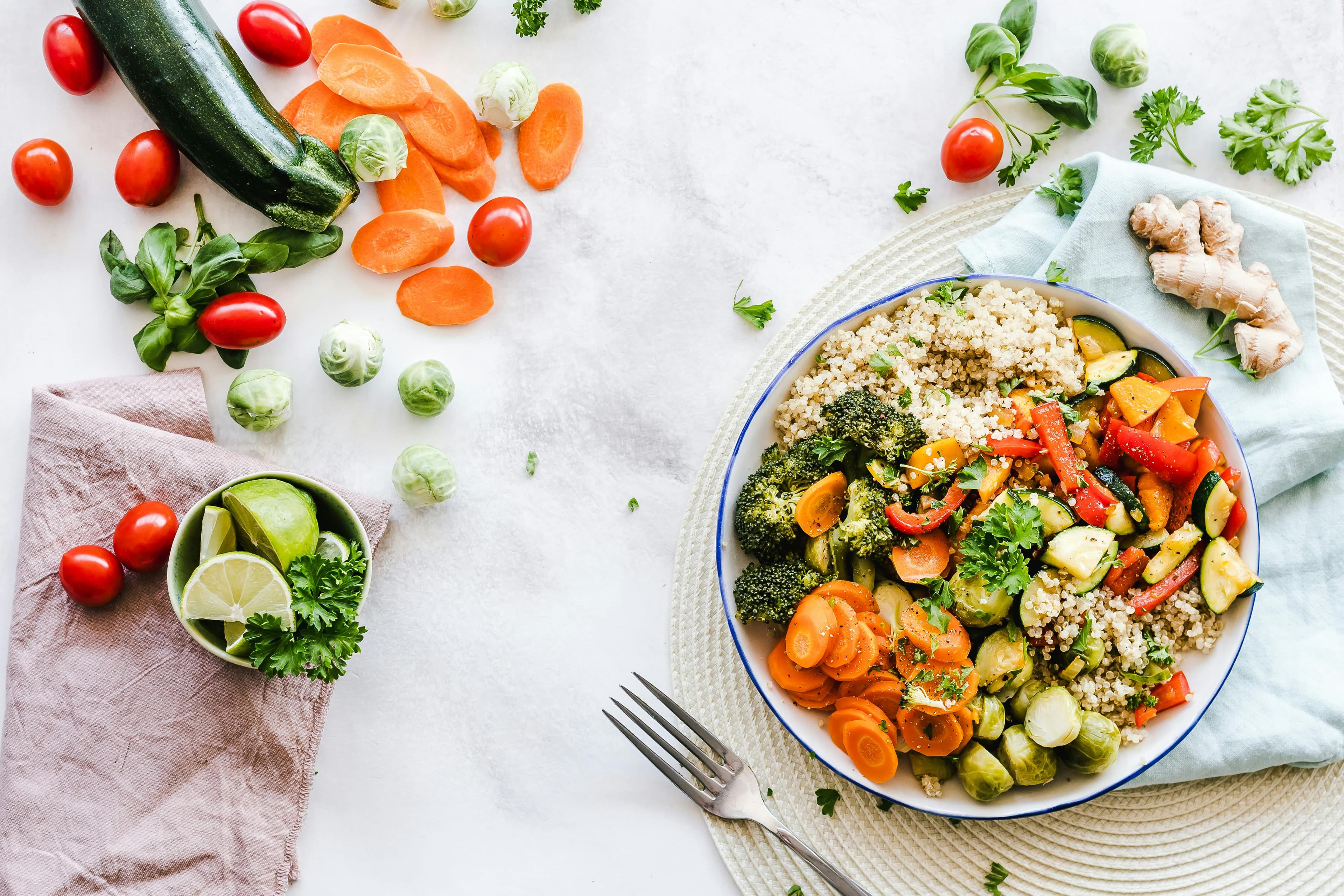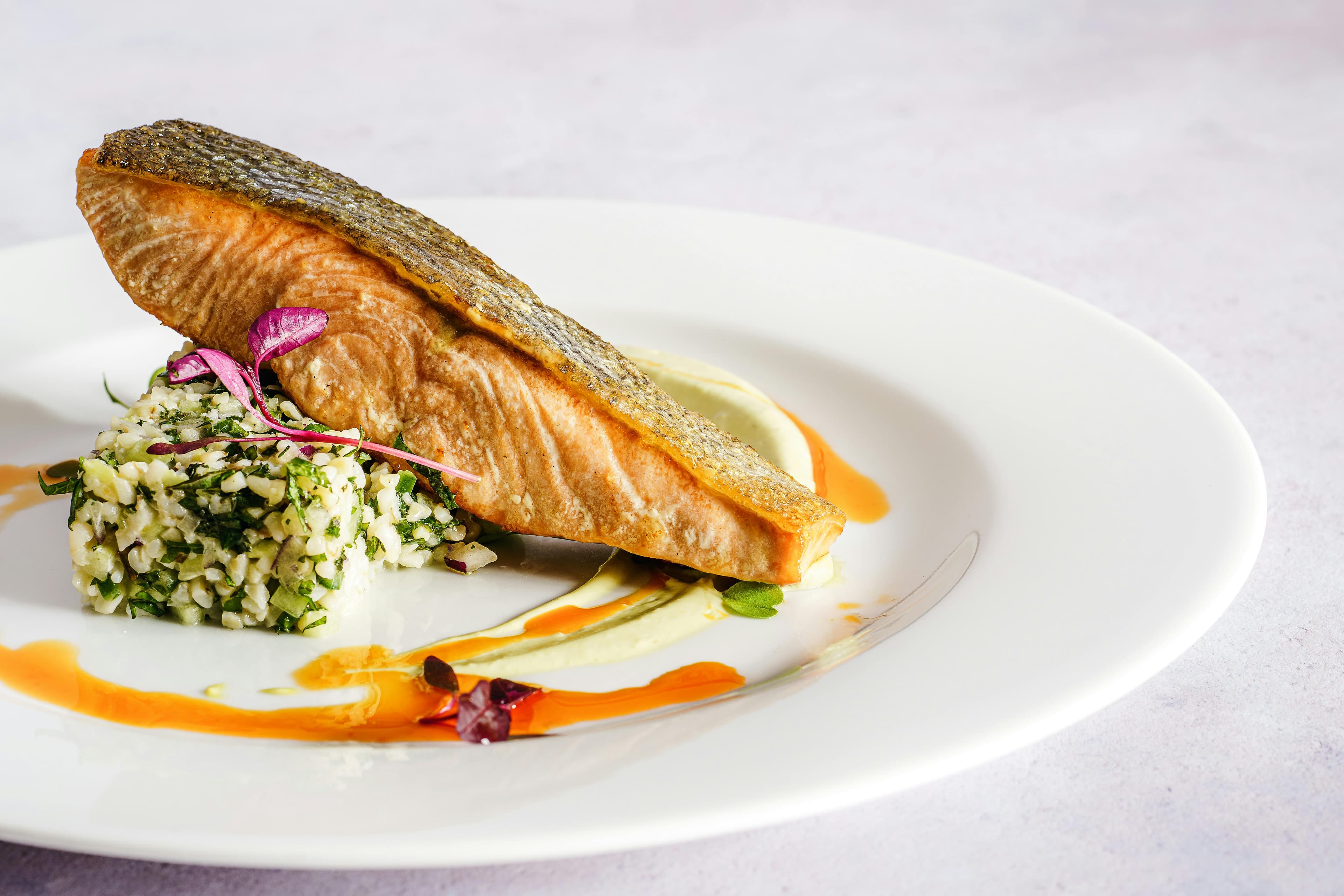Menopause Meal Plan: 7-Day Guide to Managing Symptoms Through Nutrition
Navigate menopause with confidence using this evidence-based meal plan designed to reduce hot flashes, support bone health, manage weight changes, and boost energy naturally.

Nourish Your Way Through Menopause
Evidence-based nutrition for this powerful life transition
Key Takeaways
- 75% of women experience hot flashes, but dietary changes can reduce severity by up to 65%
- Phytoestrogen-rich foods like soy and flax can naturally balance hormones
- Calcium (1,200mg) and vitamin D (800-1,000 IU) are critical for bone health
- Strategic meal timing can improve sleep quality and reduce night sweats
- Our 7-day meal plan provides complete nutrition while managing symptoms
Medical Disclaimer
This meal plan is for educational purposes only and should not replace medical advice. Always consult with your healthcare provider before making significant dietary changes, especially during menopause or if you have medical conditions. Individual results may vary.
Menopause isn't just about the end of periods—it's a complete hormonal shift that affects your metabolism, bone health, mood, and so much more. While you can't prevent menopause, you absolutely can influence how you experience it through the foods you choose.
As a registered dietitian who specializes in women's health, I've seen countless women transform their menopause experience through strategic nutrition. This isn't about restriction or complicated rules—it's about choosing foods that work with your changing body, not against it.
This 7-day meal plan provides a practical roadmap for eating during menopause, complete with recipes, shopping lists, and the science behind why certain foods can be game-changers for managing symptoms.
Menopause by the Numbers
75%
Experience hot flashes
80%
Gain weight during transition
20%
Bone density loss
65%
Improve with diet changes
How Menopause Changes Your Nutritional Needs
What Happens During Menopause
As estrogen levels decline, your body experiences significant changes that directly impact your nutritional needs:
- Slower metabolism: Metabolic rate drops 2-8% per decade after 40
- Weight redistribution: Fat shifts to abdominal area
- Bone loss: Up to 20% lost in first 5-7 years
- Vasomotor symptoms: Hot flashes affect 75% of women
- Sleep disruption: Affects 60% of menopausal women
- Mood changes: Increased risk of depression and anxiety
Nutrition Mistakes During Menopause
- • Extreme calorie restriction (slows metabolism further)
- • Skipping meals (worsens mood and energy)
- • Too little protein (accelerates muscle loss)
- • Avoiding all fats (needed for hormone production)
- • Ignoring calcium needs (bone health critical)
- • Excessive caffeine (can trigger hot flashes)
Menopause Nutrition Principles
- • Prioritize protein at every meal (25-30g)
- • Include phytoestrogen-rich foods daily
- • Focus on calcium and vitamin D
- • Choose anti-inflammatory foods
- • Stay hydrated (helps with hot flashes)
- • Time meals to support sleep
"The right nutrition strategy during menopause isn't just about managing symptoms—it's about setting yourself up for decades of vibrant health. Every meal is an opportunity to support your changing body."
M.S, RD, Registered Dietitian
Top Menopause-Fighting Foods
Phytoestrogens
Plant compounds that mimic estrogen and help balance hormones
- • Soy products (tofu, tempeh, edamame)
- • Flax seeds and chia seeds
- • Sesame seeds and tahini
- • Legumes (chickpeas, lentils)
- • Whole grains (oats, barley)
Bone Builders
Calcium and vitamin D rich foods to maintain bone density
- • Dairy products (yogurt, cheese)
- • Leafy greens (kale, collards)
- • Sardines and canned salmon
- • Fortified plant milks
- • Almonds and sesame seeds
Cooling Foods
Foods that help regulate body temperature and reduce hot flashes
- • Cucumber and watermelon
- • Mint and fresh herbs
- • Cold soups and gazpacho
- • Coconut water
- • Frozen fruit smoothies
Foods That Can Trigger Symptoms
Hot Flash Triggers:
- • Spicy foods and hot drinks
- • Caffeine (especially evening)
- • Alcohol
- • Refined sugars
Mood & Energy Disruptors:
- • Processed foods
- • Excessive sodium
- • Trans fats
- • Large meals before bed
7-Day Menopause Meal Plan
Each day is designed to provide 1,600-1,800 calories with optimal nutrition for menopause management. Adjust portions based on your individual needs and activity level.
Day 1: Foundation Day
Focus: Establishing hormone-friendly eating patterns
Breakfast: Hormone-Balancing Power Bowl
425 cal- • 1 cup Greek yogurt (plain, full-fat)
- • 2 tbsp ground flax seeds
- • 1/2 cup mixed berries
- • 1/4 cup chopped walnuts
- • 1 tsp honey
- • Green tea
Rich in: Protein (25g), calcium, phytoestrogens, omega-3s
Mid-Morning: Cooling Snack
120 cal- • 1 cup cucumber slices
- • 2 tbsp hummus
- • Fresh mint leaves
Lunch: Asian-Inspired Tofu Bowl
520 cal- • 5 oz baked tofu with sesame glaze
- • 1 cup steamed edamame
- • 2 cups mixed Asian greens
- • 1/2 cup brown rice
- • 1 tbsp sesame seeds
- • Ginger-miso dressing
Rich in: Plant protein (28g), phytoestrogens, fiber, calcium
Afternoon: Bone-Building Snack
180 cal- • 1 oz cheddar cheese
- • 1 small apple
- • 10 almonds
Dinner: Mediterranean Salmon
485 cal- • 5 oz wild salmon with herbs
- • 2 cups roasted Mediterranean vegetables
- • 1/2 cup quinoa with lemon
- • Side salad with olive oil dressing
- • Chamomile tea (evening)
Rich in: Omega-3s (35g protein), anti-inflammatory compounds
Day 1 Totals:
1,730 calories | 118g protein (27%) | 185g carbs (43%) | 65g fat (34%)
Calcium: 1,250mg | Fiber: 38g | Omega-3s: 2.1g
Day 2: Anti-Inflammatory Focus
Focus: Reducing inflammation and supporting joint health
🌅 Breakfast
Anti-Inflammatory Smoothie
Spinach, pineapple, ginger, turmeric, coconut milk, chia seeds
380 cal | 22g protein
🥗 Lunch
Rainbow Buddha Bowl
Chickpeas, roasted vegetables, tahini dressing, quinoa
535 cal | 24g protein
🍽️ Dinner
Turmeric Chicken & Vegetables
Turmeric-spiced chicken, roasted cauliflower, sweet potato
465 cal | 38g protein
Anti-inflammatory highlights: Turmeric, ginger, omega-3s, colorful antioxidants
Days 3-7: Complete Meal Plan Themes
Day 3: Bone Health Focus
Calcium-rich meals with vitamin D support
Day 4: Cooling & Hydrating
Foods to combat hot flashes and support temperature regulation
Day 5: Energy & Mood Support
B-vitamins, magnesium, and steady blood sugar
Day 6: Heart Health Focus
Omega-3s, fiber, and potassium-rich foods
Day 7: Metabolism Support
Protein-rich meals to support lean muscle mass
🎯 Weekly Nutrition Goals Met:
- • 1,200mg+ calcium daily (bone health)
- • 25-30g protein per meal (muscle preservation)
- • 5+ servings phytoestrogen foods (hormone balance)
- • 2-3 servings omega-3 rich foods (inflammation)
- • 8+ cups water daily (hot flash management)
Featured Menopause-Friendly Recipes

Cooling Cucumber Gazpacho
Perfect for hot flash relief, this refreshing soup is packed with cooling vegetables and herbs.
Ingredients:
- • 4 cups cucumber
- • 1 cup coconut water
- • Fresh mint & dill
- • Greek yogurt
Benefits:
- • Cooling effect
- • Hydrating
- • Anti-inflammatory
- • Low calorie

Sesame-Crusted Salmon with Edamame
Combines omega-3s with phytoestrogens for optimal hormone support and heart health.
Ingredients:
- • Wild salmon fillet
- • Sesame seed crust
- • Steamed edamame
- • Asian greens
Benefits:
- • High protein (35g)
- • Omega-3 fatty acids
- • Phytoestrogens
- • Heart healthy
Recipe: Golden Milk Chia Pudding
A soothing bedtime treat that supports sleep and provides anti-inflammatory benefits.
Ingredients:
- • 1/4 cup chia seeds
- • 1 cup almond milk
- • 1/2 tsp turmeric
- • 1/4 tsp cinnamon
- • Pinch black pepper
- • 1 tbsp honey
- • 1/4 tsp vanilla
Instructions:
- 1. Whisk all ingredients together
- 2. Refrigerate for 4+ hours
- 3. Stir before serving
- 4. Top with chopped almonds
- 5. Enjoy before bedtime
Menopause Benefits:
- • Turmeric reduces inflammation
- • Chia provides omega-3s
- • Magnesium supports sleep
- • Low glycemic for stable blood sugar
Nutrition: 220 cal | 8g protein | 12g fiber | 318mg calcium
Menopause Meal Plan Shopping List
Proteins
Fish & Seafood:
- □ Wild salmon (4 fillets)
- □ Sardines (canned, 2 tins)
- □ Shrimp (1 lb)
Plant Proteins:
- □ Extra-firm tofu (2 blocks)
- □ Tempeh (2 packages)
- □ Greek yogurt (large container)
- □ Eggs (1 dozen)
Produce
Cooling Vegetables:
- □ Cucumbers (3 large)
- □ Leafy greens (spinach, kale)
- □ Bell peppers
- □ Zucchini
Anti-Inflammatory:
- □ Fresh ginger root
- □ Fresh turmeric (or powder)
- □ Berries (mixed, 2 cups)
- □ Cherries (fresh or frozen)
Pantry Essentials
Phytoestrogen-Rich:
- □ Ground flax seeds
- □ Chia seeds
- □ Sesame seeds/tahini
- □ Edamame (frozen)
Bone Health:
- □ Fortified almond milk
- □ Almonds and walnuts
- □ Canned salmon with bones
- □ Dark leafy greens
🛒 Shopping Tips for Menopause:
- • Buy organic for the "Dirty Dozen" produce items
- • Choose wild-caught fish when possible for better omega-3 content
- • Look for fortified plant milks with calcium and vitamin D
- • Stock up on frozen vegetables for convenience
- • Keep herbal teas on hand for hot flash relief
Nutritional Support During Menopause
Important: Always consult with your healthcare provider before starting any supplements. This information is educational only and not medical advice.
Key Nutrients for Menopause
- Calcium + Vitamin D: 1,200mg calcium + 800-1,000 IU vitamin D daily for bone health
- Omega-3 Fatty Acids: 1-2g daily for heart health and inflammation
- Magnesium: 320mg daily for sleep, mood, and bone health
- B-Complex: Support energy metabolism and nervous system
- Probiotics: Support gut health and may help with mood
Food Sources First
Aim to get nutrients from food when possible:
- • Calcium: Dairy, leafy greens, sardines, fortified foods
- • Vitamin D: Fatty fish, fortified foods, sunlight
- • Magnesium: Pumpkin seeds, spinach, dark chocolate
- • Omega-3s: Fatty fish, walnuts, flax seeds
- • B vitamins: Whole grains, eggs, leafy greens
Beyond Food: Lifestyle Support for Menopause
Meal Timing
- • Eat every 3-4 hours to stabilize blood sugar
- • Have your largest meal at lunch when metabolism is highest
- • Avoid large meals 3 hours before bedtime
- • Start the day with protein to balance hormones
Movement Matters
- • Strength training 2-3x/week to maintain muscle
- • Weight-bearing exercise for bone health
- • Yoga or gentle stretching for stress relief
- • Regular walking to support mood and metabolism
Sleep Support
- • Keep bedroom cool (65-68°F) for hot flashes
- • Limit caffeine after 2 PM
- • Try magnesium-rich foods or tea before bed
- • Maintain consistent sleep schedule
Real Women, Real Results
Maria R., 52
Post-menopause
"Following this meal plan for 3 months completely changed my menopause experience. My hot flashes reduced by 70%, I sleep through the night, and I've maintained my weight without feeling deprived!"
✓ 70% reduction in hot flashes
✓ Improved sleep quality
✓ Stable weight
✓ Better energy levels
Karen T., 48
Perimenopause
"The focus on phytoestrogen-rich foods made such a difference in my mood swings and irregular periods. I finally feel like myself again, and my doctor was impressed with my bone density results!"
✓ Mood stabilization
✓ More regular cycles
✓ Improved bone density
✓ Better emotional balance
Get Your Complete Menopause Meal Planning Kit
Download our comprehensive menopause nutrition resources including the full 7-day meal plan, shopping lists, recipes, and hormone-balancing food guides.
Join 15,000+ women navigating menopause with confidence
References
Related Articles
Continue your PCOS journey with these helpful guides
Understanding Hormone Changes During Menopause
A comprehensive guide to hormonal shifts during menopause and their effects on your body
Exercise for Menopause: Your Complete Guide
The best exercises for managing menopause symptoms and maintaining bone health
Natural Remedies for Hot Flashes
Evidence-based natural approaches to reduce hot flashes and night sweats
Get Weekly Menopause Nutrition Tips
Join our community of women navigating menopause with evidence-based nutrition strategies
No spam, unsubscribe at any time.
Nancy Sidnam, M.S, RD
Registered Dietitian specializing in menopause nutrition
Nancy Sidnam has over 15 years of experience helping women navigate menopause through evidence-based nutrition. She holds a Master's degree in Nutritional Sciences and is a certified menopause practitioner. When not creating meal plans, she enjoys hiking and cooking with her family.